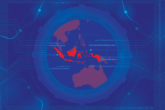March 25, 2020
As the coronavirus spreads, Americans have to flatten the misinformation curve too
Overnight, Americans have become all too familiar with the call to "flatten the curve" by taking precautionary measures to slow the spread of the deadly coronavirus (COVID-19). Fulfilling individual responsibilities in this unprecedented crisis, however, requires more than social distancing and physical isolation.
Digital interactions on social media platforms are increasing, as people's physical interactions are primarily restricted. With so many users seeking and sharing information online, the spread of misinformation about the pandemic can overwhelm social platforms, impede the government's response, and enable bad actors online. Every American must therefore do their part to flatten the misinformation curve.
Anyone can be a carrier of harmful misinformation. Because of this risk, members of the public must devote increased diligence to ensure that the information they share on social media and elsewhere is authentic and contextualized. This responsibility goes beyond merely improved "digital literacy." All Americans must embrace an attitude of "digital citizenship," treating online communications with the same level of scrutiny as in-person interactions.
Read the full article in Business Insider.
More from CNAS
-
Siliconsciousness: The AI Competition: Public Policy Strategies: Part 1
This episode comprises the first part of our special event, “The AI Competition: Public Policy Strategies”. The event, co-hosted by MIT Technology Review, brings together some...
By Dr. ED McGrady
-
How Drones in Ukraine Are Reshaping War
Samuel Bendett, a senior adjunct fellow at the Center for a New American Security, joins The Cipher Brief to discuss the current situation of drones being used in Ukraine.Watc...
By Samuel Bendett
-
Countering the Digital Silk Road: Indonesia
This year marks the 10th anniversary of the Digital Silk Road (DSR), China’s ambitious initiative to shape critical digital infrastructure around the world to advance its geop...
By Vivek Chilukuri & Ruby Scanlon
-
How Secure Is America’s AI Advantage?
https://www.youtube.com/watch?v=7njJkH7XRa8...
By Paul Scharre



